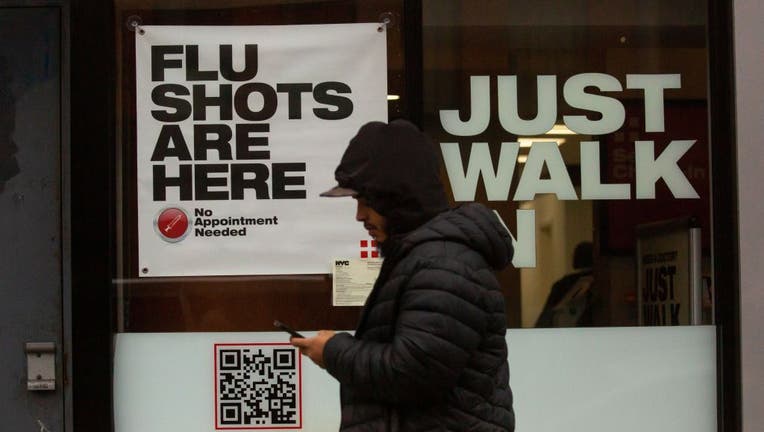What's the difference between the flu, RSV and COVID-19?

A man walks past an urgent care facility offering flu shots in New York, the United States, on Dec. 7, 2022. The United States is experiencing surge in respiratory illnesses including COVID-19, flu and respiratory syncytial virus RSV, worsening the s
Authorities in New York City and across the nation are warning Americans about the possibility of a so-called "tripledemic" of influenza (flu), COVID-19 and RSV.
All three are respiratory viruses that can be easily mistaken for one another, due to similar symptoms. And while testing remains the best way to figure out what virus you might have, there are some small differences between the three that might give you a clue as to which one you've contracted.
RSV
- RSV, or respiratory syncytial virus, causes a cough, runny nose and a fever, and one of the unique symptoms of the virus is a wheeze or rattle when someone breathes.
- A very common virus, most children will get RSV by the time they turn 2 years old.
- In some cases, it can lead to severe illnesses like bronchiolitis, the swelling of the small airways in the lungs or pneumonia.
Influenza
- One of the most distinctive signs of the flu is a high fever, reaching 103 or 104 degrees Fahrenheit. It can also cause nausea and vomiting, along with fever, chills, fatigue, and headache.
- Children under the age of 5 and especially those under 2 are at higher risk of complications from the flu, including dehydration, ear and sinus infections, inflammation of the heart or brain tissues and pneumonia.
COVID-19
- COVID-19 has symptoms similar to flu and RSV, but unlike those viruses, can have a major effect on body systems outside the lungs, even causing the condition known as "Long COVID."
- Symptoms of COVID-19 include a cough, headache, shortness of breath, loss of taste or smell, diarrhea, and more.

Dr. Fauci discusses COVID-19, masks, fear of ‘tripledemic’
Dr. Anthony Fauci, the nation’s top infectious-disease expert, joined Good Day New York to discuss what's next for him after he prepares to step down from decades in public service at the end of the month. Fauci also discussed the COVID-19 pandemic, masks and the fear of a "tripledemic."
Again, the best way to figure out what virus you or your child might have is to get tested by a doctor. Many clinics now have tests that can detect flu, RSV, or COVID-19 with a single swab.
Treatment options for all three viruses are broadly the same, comfort care, managing the fever and pain with ibuprofen or acetaminophen, and staying hydrated.
Experts with the Cleveland Clinic recommend that you reach out to your child's healthcare provider if they have trouble breathing, symptoms that haven't improved or are getting worse after five days, or severe vomiting and diarrhea to a point where they are not eating or drinking.

